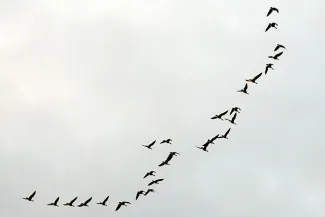
EarthTalk - Is it ethical for birders to use ‘playback’ to see birds?
© iStock
Dear EarthTalk:
Is it ethical for birders to use “playback” to see birds?
P.L., via email
Birders and wildlife photographers can become frustrated or overzealous when searching for elusive species. Tempted to get that perfect avian silhouette in the binocular or camera lens, they turn to a concept that has been made possible with the widespread use of portable technology: playback, the playing of a recording of a bird’s call to attract the bird whose song they play (given that the bird is within earshot).
The ethical debate surrounding playback has arisen due to the sheer number of people who now have the ability to play these bird songs from their phones. Whether a serious birder, photographer, researcher or casual hiker, the sounds are much more frequent now versus the days when some were able to imitate bird calls themselves. Research suggests playback can be disruptive and even detrimental to some species.

Flock of geese. © Chris Sorensen / KiowaCountyPress.net
Many smaller bird species are prey of larger bird species. When someone plays the call of a predatory bird, it can make smaller birds panic. This fearful state causes them to limit normal eating, foraging and breeding. Playback can also cause prey birds to neglect their nests, sometimes entirely abandoning them. This is especially deleterious to at-risk and endangered species struggling to maintain a foothold.
“Before we had devices, good guides were experts at imitating bird calls. I don’t think there was a particular harm in that because they were not doing it repeatedly or in a way that disturbed the birds,” reports naturalist Stephen Alter on Mongabay-India, a conservation platform. “Now you can download any bird call, attach it to an amplifier and start using it in the wild and the poor birds get very confused.
These disturbances also impact scientific research and can be an obstacle to investigation. Scientists use playback in order to band birds or retrieve geolocators to study their movements. “Certain species will hear so much playback, they won’t respond well when researchers attempt to capture them,” says Jennifer Tyrell, a Master Bird Bander with Audubon South Carolina. According to Audubon, playing recordings of birds is illegal in national parks and national wildlife refuges in the U.S. Otherwise in the U.S. and globally rules vary greatly.
If you’re a birder or wildlife photographer, follow guidelines in park and nature preserves, and check with the offices if you’re unsure if playback is allowed. Even if it is permitted, consider the negative impacts it can have. Use playback indoors to learn bird sounds before heading into the field. This way, you will know which avian species you are hearing and observing without disruption. Educate your fellow birders and photographers on the drawbacks of using bird recordings in the wilderness, and lead by example.
CONTACTS
- Why Photographers Should Reconsider Using Playback, https://www.audubon.org/news/why-photographers-should-reconsider-using-playback-field.
EarthTalk® is produced by Roddy Scheer & Doug Moss for the 501(c)3 nonprofit EarthTalk. See more athttps://emagazine.com. To donate, visit https://earthtalk.org. Send questions to: question@earthtalk.org.

















